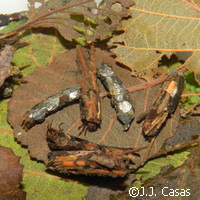Europeans investigate ecological status of streams
An international team of researchers put the ecological status of 100 streams in Europe in the spotlight, paying particular attention to excessive nutrient loading. Aquatic ecosystems around the globe feel the pressure of excessive nutrient loading, which leads to major shifts in aquatic biodiversity and biogeochemical processes. Presented in the journal Science, this study performed a systematic quantitative assessment by using a leaf-litter breakdown, finding a strong nutrient limitation in unaffected systems. Researchers usually measure temperature, acidity and nutrient concentrations to get a handle on what is happening inside rivers and streams. They also look at insect larvae and other small streambed organisms, what experts call the benthic macroinvertebrate community, to obtain the information they need. But in this latest study, researchers led by University College Cork and National University of Ireland went one step further and observed that a dramatically slowed breakdown at both extremes of the gradient showed strong nutrient limitation in unaffected systems, making it possible for strong stimulation in moderately altered systems and inhibition in highly polluted streams. Co-author Professor Mark Gessner from the Swiss Federal Institute of Aquatic Science and Technology (EAWAG) said the current measures are no longer adequate for evaluating an ecosystem as a whole. 'Just as a patient can be ill without having a temperature, rivers and streams with clean water can still have a lot of other problems as ecosystems,' said the researcher, who is now a member of the Institute of Integrative Biology in Switzerland and the Leibniz-Institute of Freshwater Ecology and Inland Fisheries in Germany. He went on to say that the functioning of processes, which are characteristic of natural systems, also play an integral role for ecosystems to be healthy. The breakdown of leaf litter was key in this study. 'Litter input is the main source for stream food webs and is of major importance for whole-system metabolism,' said Professor Gessner. Microscopic fungi and benthic macroinvertebrates help break down leaf litter. The team used mesh bags filled with oak and alder leaves in streams found in France, Ireland, Poland, Portugal, Romania, Spain, Sweden, Switzerland and the United Kingdom. They calculated the time it took for half of the leaf litter to break down. They also measured the number and diversity of benthic macroinvertebrate species, as well as concentrations of phosphate and inorganic nitrogen compounds. According to the team, low-nutrient waters contain few organisms that can use litter resources efficiently. They added that conditions in heavily enriched waters are also unfavourable for organisms of this kind. So the breakdown rates were low in both cases. But they found no link between concentrations, benthic macroinvertebrates and breakdown rates for intermediate nutrient concentrations. A faster litter breakdown could point to impairments triggered by nutrients in cases where conventional methods would suggest good water quality. Said Professor Gessner: 'Just "taking the patient's temperature" is certainly no longer a reliable way of checking the health of streams and rivers in Europe. Modern assessment of freshwater ecosystems calls for the kind of differential diagnosis which we take for granted in medicine - identifying the underlying causes of symptoms on the basis of additional criteria. Here, processes such as litter breakdown can make an important contribution.'For more information, please visit:University College Cork:http://www.ucc.ie/en/National University of Ireland:http://www.nui.ie/Swiss Federal Institute of Aquatic Science and Technology (EAWAG):http://www.eawag.ch/index_ENScience:http://www.sciencemag.org/
Countries
Switzerland, Germany, Ireland



